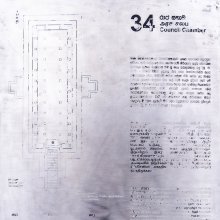Piya, Piyā: 5 definitions
Introduction:
Piya means something in Buddhism, Pali, Hinduism, Sanskrit, Hindi. If you want to know the exact meaning, history, etymology or English translation of this term then check out the descriptions on this page. Add your comment or reference to a book if you want to contribute to this summary article.
Images (photo gallery)
In Buddhism
Theravada (major branch of Buddhism)
Source: Pali Kanon: Pali Proper NamesThe eldest of the five daughters of the third Okkaka, her mother being Hattha. She developed a skin disease, and her brothers, not wishing to be near her, took her into the forest and left her near a pond. There she met Rama, king of Benares, who, afflicted with a similar disease, was living in exile in the forest. After hearing Piyas story, he married her, and they had thirty two children, who became the ancestors of the Koliyans. SNA.i.352f., 355f.; DA.i.258; MT.131.
Theravāda is a major branch of Buddhism having the the Pali canon (tipitaka) as their canonical literature, which includes the vinaya-pitaka (monastic rules), the sutta-pitaka (Buddhist sermons) and the abhidhamma-pitaka (philosophy and psychology).
Languages of India and abroad
Pali-English dictionary
Source: BuddhaSasana: Concise Pali-English Dictionarypiya : (adj.) dear; amiable; beloved. (m.) the husband. (nt.) a dear thing. || piyā (f.) the wife.
Source: Sutta: The Pali Text Society's Pali-English Dictionary1) Piya, 2 (sporadic for phiya, q. v. ) oar; usually so in cpd. piyâritta (nt.) oar & rudder S. I, 103; A. II, 201; J. IV, 164. (Page 460)
2) Piya, 1 (adj.) (Vedic priya, prī, cp. Gr. proprow/n; Goth. frijōn to love, frijonds loving=E. friend; Ger. frei, freund; Ohg. Frīa=Sk. priyā, E. Friday, etc. ) dear, in two applications (as stated Nd1 133=Nd2 444, viz. dve piyā: sattā vā piyā saṅkhārā vā piyā, with ref. to living beings, to sensations): 1. dear, beloved (as father, mother, husband, etc.) S. I, 210 (also compar. °tara); Dh. 130, 157, 220; Vism. 296, 314 sq.; often combd with manāpa (pleasing, also in 2), e.g. D. II, 19; III, 167; J. II, 155; IV, 132.—2. pleasant, agreeable, liked Sn. 452, 863: Dh. 77, 211; often combd (contrasted) with appiya, e.g. Sn. 363, 450 (see also below). nt. piyaṃ a pleasant thing, pleasantry, pleasure S. I, 189; Sn. 450, 811; DhA. III, 275.—appiya unpleasant M. I, 86; Kh VIII, 5. appiyatā unpleasantness J. IV, 32. See also pīti & pema.—âpāya separation from what is dear to one, absence of the beloved A. III, 57; Dh. 211.—âppiya pleasant & unpleasant D. II, 277 (origin of it); Dh. 211.—kamya friendly disposition Vin. IV, 12.—ggāhin grasping after pleasure Dh. 209, cp. DhA. III, 275.—cakkhu a loving eye D. III, 167.—dassana lovely to behold, goodlooking D. III, 167.—bhāṇin speaking pleasantly, flattering J. V, 348.—manāpatā belovedness M. I, 66.—rūpa pleasant form, an enticing object of sight D. I, 152 (cp. DA. I, 311); S. II, 109 sq.; A. II, 54; It. 95, 114; Sn. 337, 1086 (cp. Nd2 445); Vbh. 103; Nett 27.—vacana term of endearment or esteem, used with ref. to āyasmā Nd2 130; SnA 536, etc.; or mārisa SnA 536.—vācā pleasant speech S. I, 189; Sn. 452.—vādin speaking pleasantly, affable D. I, 60 (manāpacārin+); A. III, 37; IV, 265 sq.—vippayoga separation from the beloved object Sn. 41 (cp. Nd2 444); PvA. 161 (here with ref. to the husband); syn. with appiya-sampayoga, e.g. at Vism. 504 sq. (Page 460)

Pali is the language of the Tipiṭaka, which is the sacred canon of Theravāda Buddhism and contains much of the Buddha’s speech. Closeley related to Sanskrit, both languages are used interchangeably between religions.
Sanskrit dictionary
[Sanskrit to German]
Sanskrit, also spelled संस्कृतम् (saṃskṛtam), is an ancient language of India commonly seen as the grandmother of the Indo-European language family (even English!). Closely allied with Prakrit and Pali, Sanskrit is more exhaustive in both grammar and terms and has the most extensive collection of literature in the world, greatly surpassing its sister-languages Greek and Latin.
Hindi dictionary
Source: DDSA: A practical Hindi-English dictionary1) Piya (पिय) [Also spelled piy]:—(nm) (darling) husband.
2) Piyā (पिया):—(nm) (darling) husband.
...
See also (Relevant definitions)
Starts with (+66): Piya Sutta, Piya Vagga, Piyaala, Piyaan, Piyaan-buhintahe rumi, Piyaanbu, Piyabhani, Piyadasana, Piyadassi, Piyag-miu, Piyai, Piyainu, Piyaj, Piyajali, Piyajatika Sutta, Piyaka, Piyakamyata, Piyakapasana, Piyakatai, Piyakatam.
Ends with (+102): Abupiya, Agampiya, Agnikashyapiya, Akampiya, Akappiya, Akappiya, Akasukkhipiya, Akhampiya, Alopiya, Amapiya, Ambasuppiya, Amshumatkashyapiya, Anapiya, Anappiya, Anapupiya, Anugampiya, Anukampiya, Anupiya, Anuppiya, Anutapiya.
Full-text (+40): Piy, Piyayati, Piyala, Piyas, Pi, Pratipiya, Chota piya, Appiya, Prasavaka, Hattha, Aritta, Vippayoga, Apiya, Yuropa, Atta Piya Sutta, Papiyana, Anukankhin, Sampiya, Piya Sutta, Vacapeyya.
Relevant text
Search found 14 books and stories containing Piya, Piyā, Pīya, Piyaa; (plurals include: Piyas, Piyās, Pīyas, Piyaas). You can also click to the full overview containing English textual excerpts. Below are direct links for the most relevant articles:
Guide to Tipitaka (by U Ko Lay)
Part VI - Yamaka Pali < [Chapter X - Abhidhamma Pitaka]
Dhammapada (Illustrated) (by Ven. Weagoda Sarada Maha Thero)
Chapter 16 - Piya Vagga (Affection)
Verse 157 - The Story of Bodhirājakumāra < [Chapter 12 - Atta Vagga (Self)]
Verse 130 - The Story of a Group of Six Monks (continued) < [Chapter 10 - Daṇḍa Vagga (Punishment)]
The Great Chronicle of Buddhas (by Ven. Mingun Sayadaw)
Part 7 - A Brief History of the Royal Lineage of the Bodhisatta < [Chapter 1 - The Story of Sataketu Deva, The Future Buddha]
(10) Tenth Pāramī: The Perfection of Equanimity (upekkhā-pāramī) < [Chapter 6 - On Pāramitā]
Part 13 - What are the Factors for accomplishing the Pāramīs < [Chapter 7 - On Miscellany]
Sahitya-kaumudi by Baladeva Vidyabhushana (by Gaurapada Dāsa)
Text 10.145 < [Chapter 10 - Ornaments of Meaning]
Gemstones of the Good Dhamma (by Ven. S. Dhammika)
The Buddha and His Disciples (by Venerable S. Dhammika)

